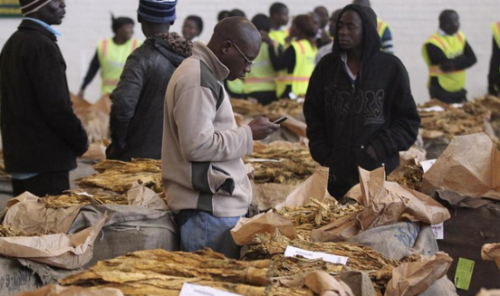
15 Years After Land-Grabs, Mugabe Invites White Farmers Back To Zimbabwe
Tyler Durden
File this one away in the "when populism backfires" folder.
A little over a month after announcing [3] that the Zimbabwean dollar - which, you’re reminded, was phased out in 2009 after inflation rose modestly to 500 billion percent - would be demonetized and exchanged at a generous rate of $5 for every 175 quadrillion, Zimbabwe will for the first time rethink the sweeping land grabs which began in 2000 and subsequently crippled the country’s economy.Many Zimbabwean farmers who have stopped growing food in favor of "green gold" (tobacco) fear they will starve this winter after a severe drought and a generalized "lack of knowledge" left them with a subpar crop that fetched little at auction. Here’s more from Rueters [4]:
Thousands of small-scale farmers in Zimbabwe fear they will be going hungry this winter after abandoning traditional staples like maize, sorghum and groundnuts for tobacco, a cash crop known locally in this southern African nation as "green gold".
For 15 years after Zimbabwe's agriculture sector collapsed in the face of President Robert Mugabe's seizure of white-owned farms to resettle landless blacks, the tobacco industry has been booming, with farmers funded by private firms to grow tobacco.
But this switch, coupled with the worst regional drought in nearly a decade, has left Zimbabwe in a precarious food situation. Many farmers have complained of low prices as the season ends while buyers argue the quality of the crop was poor.
The tobacco industry has become the country's biggest export earner with over 88,000 growers registered with the tobacco regulatory body, the Tobacco Industry and Marketing Board, in the 2014/15 season, up from 52,000 in 2012.
But the returns are often uncertain and many farmers have been left disappointed.
Industry figures showed that at the end of the selling season this month farmers sold 188.5 million kgs worth $555 million, down 8.5 percent from a year ago when the crop was worth $654 million.
"It was a disaster," said David Muyambo, 35, a father of four, who earned $74 from tobacco sales this season after investing $1,200 in his crop. "I need to buy food for my family and I have no money."
Muyambo blames his failure on erratic rains, which decimated his crop, as well as his lack of knowledge on how to apply fertilizer, remove suckers and cure the crop.
Muyambo said he will never farm tobacco again.
With more farmers focused on tobacco, Zimbabwe's harvest of maize, a staple food, dropped by 49 percent in the 2014/15 season, the government said, which is set to exacerbate food shortages in Zimbabwe, once the bread-basket of the region.
Against this rather dreary backdrop, the government is beginning to reconsider its stance towards white farmers and will, according to The Telegraph, "give official permission for some whites to stay on their land."
Via The Telegraph [6]:
Zimbabwe’s government has for the first time suggested it may give official permission for some white farmers to stay on their land, 15 years after it sanctioned widespread land grabs that plummeted the country into an economic crisis.
Douglas Mombeshora, the Zanu-PF Lands Minister, said provincial leaders had been asked to draw up a list of white farmers they wanted to stay on their farms deemed to be “of strategic economic importance”.
“We have asked provinces to give us the names of white farmers they want to remain on farms so that we can give them security of tenure documents to enable them to plan their operations properly,” Mr Mombeshora said.
More than 4,000 white farmers lost their land after Mr Mugabe lost a referendum to the new Movement for Democratic Change party and, in a bid to regain popularity, authorised land grabs by disaffected war veterans.
Today, fewer than 300 white farmers remain on portions of their original land holdings in Zimbabwe and many of the seized farms lie fallow, meaning the former Breadbasket of Africa has to import food to feed its population.
Among remaining farmers who have been recommended for a reprieve of Mr Mugabe’s edict that whites can no longer own land in Zimbabwe is Elizabeth Mitchell, a poultry farmer who produces 100,000 day-old chicks each week.
And so once again we see that necessity (a food shortage) breeds invention (rethinking populist land grabs), but lest anyone should believe that Mugabe has done a complete 180, we'll close with the following advice given to supporters at a recent Patriotic Front rally:
"Don't be too kind to white farmers. They can own industries and companies, or stay in apartments in our towns but they cannot own land. They must leave the land to blacks.”

